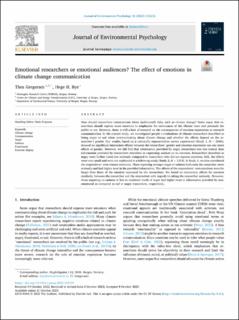Emotional researchers or emotional audiences? The effect of emotions in climate change communication
Journal article, Peer reviewed
Published version

Åpne
Permanent lenke
https://hdl.handle.net/11250/3111767Utgivelsesdato
2023Metadata
Vis full innførselSamlinger
Sammendrag
How should researchers communicate about (politicized) risks, such as climate change? Some argue that researchers should express more emotions to emphasize the seriousness of the climate issue and persuade the public to act. However, there is still a lack of research on the consequences of emotion expressions in research communication. In the current study, we investigated people's evaluations of climate researchers described as being angry or sad when communicating about climate change and whether the effects depend on the researcher's gender. Our results, based on a nationally representative survey experiment (Study 1, N = 2046), showed no significant interaction effects between the researchers' gender and emotion expression nor any main effects of gender. However, we did find that information provided by angry researchers was less trusted than information provided by researchers described as expressing sadness or no emotion. Researchers described as angry were further taken less seriously compared to researchers who did not express emotions. Still, the effects were very small and were not replicated in a follow-up study (Study 2, N = 1219). In Study 1, we also considered the respondents' own climate emotions. Those reporting stronger anger or sadness both took the researcher more seriously and had higher trust in the provided information. The effects of the respondents' own emotions were far larger than those of the emotion expressed by the researchers. We found no interaction effects for emotion similarity between the researcher and the respondent with regards to taking the researcher seriously. However, those reporting no sadness or low to moderate levels of anger had higher trust in information provided by non-emotional as compared to sad or angry researchers, respectively.
